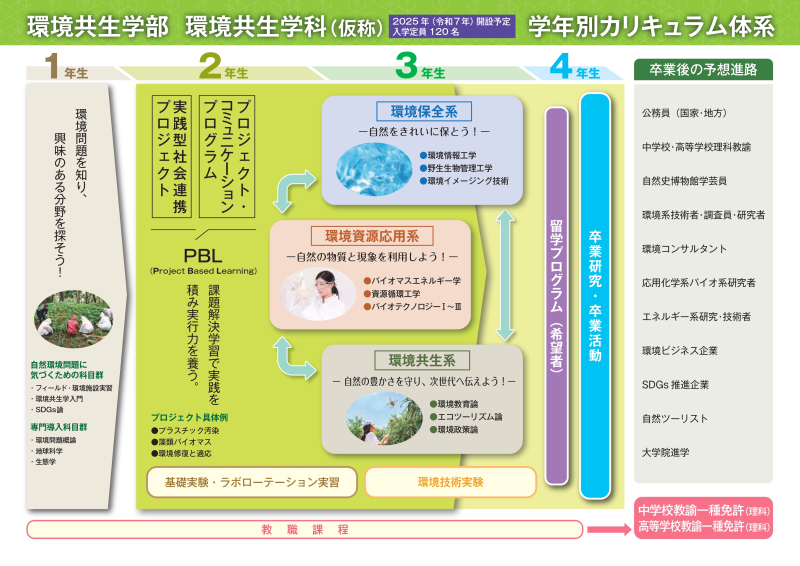2025年4月、人と自然の関わりを科学する 環境共生学部を設置構想中です。
2023/12/28
English below.
武庫川女子大学は2025年4月、13番目の学部となる環境共生学部を開設予定です(設置構想中)。理系転換による大学の機能強化を支援する文部科学省の「大学・高専機能強化支援事業」に選定されており、女性の理系人材育成とともに、文理の枠にとらわれず、新しい発想で社会に貢献できる人材を育成します。
今なぜ環境共生学部なのでしょうか。
温室効果ガスの排出、異常気象、海洋汚染、土壌汚染、生物多様性の縮小――。危機的現状を好転させ、持続可能な地球環境と人類の未来を守るには、人と自然の現状を正しく理解する科学的知識、あらゆる事象に「問い」を立てる柔軟な発想力、そして行動する力が必要です。拡大するグリーン(エネルギー・環境)分野をはじめ、新たな発想で突破口を拓く意欲的な人材が求められており、とりわけ女性の台頭が待たれています。
武庫川女子大学の環境共生学部環境共生学科は地球規模の課題を肌で感じるため、フィールドワークを重視します。そこで見出した問いを持ち帰り、プロジェクトを設定します。プロジェクトを実行する専用の居場所であるプロジェクトルームでは常に複数のプロジェクトが走り、チームは互いに刺激しあいながら、それぞれの課題に向き合います。フィールドワークには本学の施設である丹嶺学苑研修センター(神戸市北区)、名塩野外活動センター(西宮市)、時にはアメリカ・ワシントン州にあるアメリカ分校を活用して行います。産官学のコラボレーションで地域との連携も深めます。健康や食、心理、薬、建築、経営など多様な学部と連携し、相乗効果をめざせるのも総合大学ならではの強みです。
河川や海洋、大気、水質を問う「環境保全」、地質や里山、生物多様性を問う「環境共生」、微生物や遺伝子、鉱物等の地球資源の活用を問う「環境資源応用」の3つの領域から科目を自在に選び、少人数でのプロジェクトを通して知識と技術の修得につなげます。
教員には様々な専門領域をカバーする各分野の専門家を配置。プロジェクトごとに担当教員を配置し、専門性に特化した科目選択を支援します。
定員 :120人
収容定員 :480人
メーンキャンパス:浜甲子園キャンパス
【教員の主な専門領域】
バイオテクノロジー/環境レメディエーション/砂防/大気/動物/自然災害/化学/植物(藻類)/生態系
【4年間の学びのイメージ】
1年前期)
■フィールド・環境施設実習
近隣の里山、酒造会社など阪神間の特色ある企業、リサイクル施設等を訪ねて課題を見出し、プロジェクトを立ち上げる。環境に関する基礎的な知識を習得する。
1年後期~3年前期)
■実践型社会連携プロジェクト
少人数のプロジェクトに参加してそれぞれの課題解決に挑む。
■3つの科目群(環境保全系/環境資源応用系/環境共生系)から興味のある科目を選択してオーダーメイドのカリキュラムを設定
3年後期~4年)
■自分が取り組みたいテーマを設定し、卒業研究に取り組む。その成果を発表する。
【取得できる資格】
中学校教諭一種(理科)、高等学校教諭一種(理科)、学芸員、危険物取扱者(甲種)
【想定される進路】
環境系技術者(海洋、水質、大気等自然環境の調査・測定・分析を行う)/環境調査員(建築や工事を行う環境の前調査を行う)/応用化学系研究者/バイオ研究者/エネルギー系研究者・エンジニア/環境・サスティナビリティコンサルタント/ビオトープ管理士/環境アセスメント調査員/環境保全エンジニア/環境ジャーナリスト/公的な環境研究所/環境ビジネス系企業/企業のSDGs推進担当/環境政策担当者/自然ツーリスト/自然史博物館学芸員/公務員/大学院進学/中学・高校理科教員/
(内容は構想中のものであり、変更の可能性があります)
In April 2025, the establishment of the School of Environment and Sustainability will be underway, which will focus on the relationship between people and nature.
Mukogawa Women's University plans to open its thirteenth undergraduate course, the School of Environment and Sustainability, in April 2025 (currently under planning for establishment). The university has been selected by the Ministry of Education, Culture, Sports, Science and Technology (MEXT) for its "Project to Support the Functional Enhancement of Universities and Colleges of Technology," which supports the strengthening of university functions through the conversion to science-related fields.
So why the Department of Environmental Studies and Symbiosis now?
In order to turn around the current crisis and protect a sustainable global environment and the future of humankind, we need scientific knowledge to comprehend the current situation of people and nature, the ability to think flexibly to ask questions about all phenomena, and the ability to take action. In the expanding field of green (energy and environment) and other fields, there is a need for ambitious professionals who can make breakthroughs with new ideas, and especially the emergence of women in this field is eagerly awaited. These also include looking into greenhouse gas emissions, abnormal weather, ocean pollution, soil contamination, and depleting natural resources.
Mukogawa Women's University's School of Environment and Sustainability emphasizes fieldwork in order to gain firsthand experience with global issues. Students take the questions they discover back home and set up their own projects. In the project room, which is a dedicated place for executing projects, multiple assignments are always running, and the teams face their own issues while stimulating each other. Fieldwork is conducted at MWU facilities such as Tantei-Gakuen Training Center (Kita-ku, Kobe City), Nashio Outdoor Activity Center (Nishinomiya City), and sometimes at the American Campus MUSC) in Washington State, USA.
The faculty consists of experts in each field covering a variety of specialized areas. A faculty member is assigned to each project to support students in selecting specialized courses.



